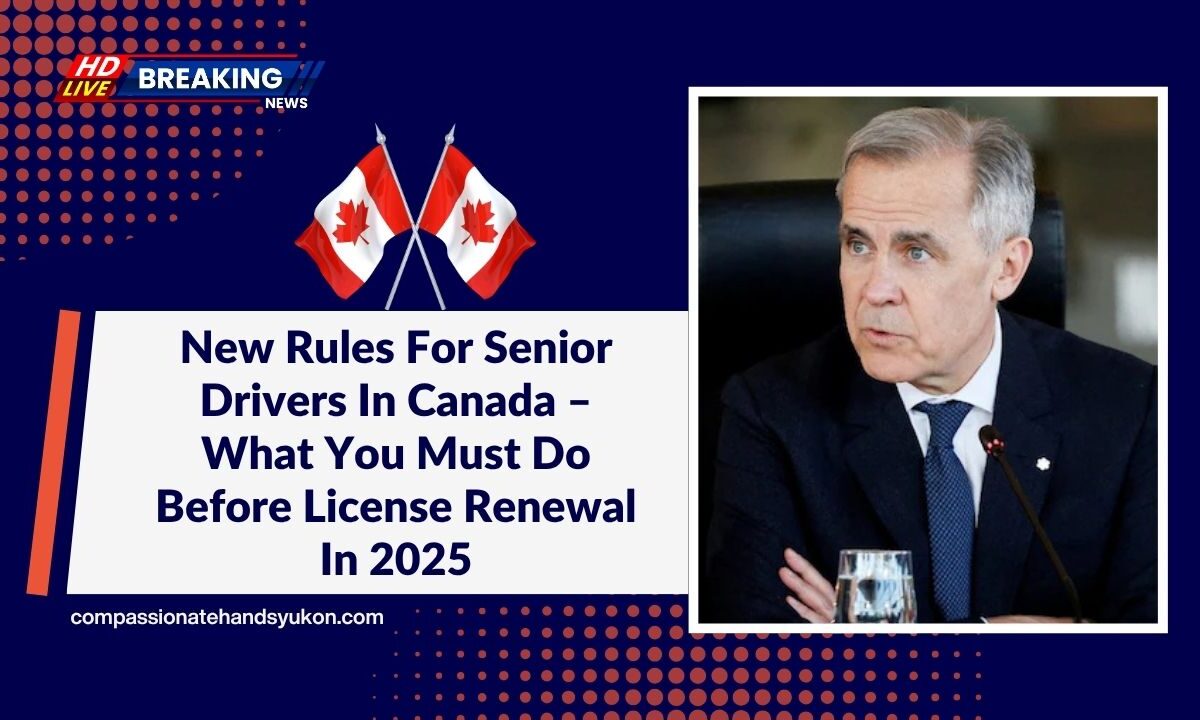As Canada adapts to an aging population, new driving license renewal rules for senior drivers will come into force in August 2025. These updates are part of a nationwide push to balance road safety with the independence of older drivers.
The federal and provincial governments have jointly agreed on structured assessments and revised renewal cycles for citizens aged 65 and above.
This article explains the new requirements, why they’re being introduced, how to prepare for them, and their impact on driving rights and safety.
Why Are New Senior Driving Rules Being Implemented?
The senior population in Canada is growing rapidly. According to official projections, by 2030, one in four Canadians will be over 65. This demographic shift has prompted policymakers to examine how aging affects driving safety.
Medical evidence points to increased risks due to:
- Declining vision
- Slower reaction times
- Cognitive impairments
- Chronic health conditions
Rather than implementing blanket restrictions, Canada’s approach is to evaluate fitness to drive on a case-by-case basis using medical assessments, vision testing, and knowledge checks.
Key Rules Starting August 2025 for Senior Drivers
The new tiered policy evaluates drivers based on their age group. This allows for regular monitoring without penalizing those who remain safe drivers.
| Age Group | New Requirements |
|---|---|
| 65–69 | Standard renewal applies, no changes. |
| 70–74 | Medical report required at every renewal. |
| 75–79 | Medical report + in-person vision test. |
| 80–84 | Renewal period reduced to every 2 years. |
| 85+ | Mandatory group education, written knowledge test, and possibly a road test. |
These changes promote fairness by focusing on capability, not age, and ensuring ongoing roadworthiness through professional evaluation.
What to Do Before Your License Renewal in 2025
Senior drivers are encouraged to begin preparations at least 60 days before their license expires. Here’s a step-by-step checklist to make the process smoother:
- Book a medical appointment for your general health assessment.
- Update your eyeglasses/contact lens prescription.
- Review your province’s driver’s handbook for the written test.
- Locate and register for group education sessions (age 85+).
- Verify your contact details with your provincial transportation authority.
Being proactive can prevent last-minute delays—especially if multiple tests or documents are required.
Supporting Senior Mobility and Safety
While some may fear the new rules threaten independence, authorities clarify that their goal is not to revoke licenses, but to ensure that those who continue driving do so safely.
To support older adults, provinces are also rolling out:
- Discounted senior transit passes
- Community transport services for medical appointments
- On-demand mobility options
These services help those who are no longer eligible to drive maintain access to essential activities.
Nationwide Alignment Brings Clarity
Although driver licensing is a provincial matter, the August 2025 update reflects a broader national alignment. This helps reduce confusion for both drivers and families, and ensures equal treatment across Canada.
Benefits of the national framework include:
- Easier navigation of rules by caregivers and seniors.
- Consistent evaluation criteria for medical professionals.
- Simplified public education on senior driving safety.
What Happens If You Don’t Pass?
If a senior driver is found unfit to drive—due to medical, vision, or knowledge test results—the licensing authority may take the following steps:
- Require a road test to re-evaluate driving skills.
- Ask for additional medical documents.
- Recommend restrictions (e.g., daytime-only driving).
- Temporarily or permanently suspend the license.
In some cases, seniors may be able to reapply if their condition improves.
Family members may also request a review if they notice unsafe driving habits in loved ones.
Respecting Dignity While Ensuring Safety
The government emphasizes that this policy is designed with respect and dignity at its core. Seniors who meet the required health and cognitive standards will continue to renew their licenses and drive freely.
By recognizing ability over age, Canada is setting a model for how to safeguard public roads while honoring the independence of older citizens.
Canada’s new 2025 senior driving license rules represent a thoughtful shift toward safety without sacrificing independence.
With structured assessments starting at age 70 and increased support systems in place, the policy ensures that seniors who are fit to drive continue to do so—while those at risk receive appropriate guidance and alternatives.
If you or a loved one is over 65, now is the time to prepare for renewal, book your assessments, and stay informed to navigate this process with confidence.
FAQs
Will I lose my license automatically after turning 75?
No. You will need to provide a medical report and vision test, but if you pass, you can renew your license as normal.
Do these rules apply in every province?
Yes. While each province handles licensing, the August 2025 rules are part of a national alignment to maintain uniform safety standards.
Can a family member request a driving review for a senior?
Yes. If someone observes dangerous driving behaviors in a senior, they can report it to the licensing authority for an evaluation.

